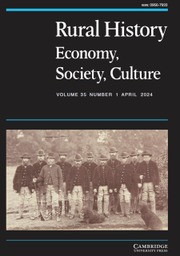Article contents
Finance versus Farming: Rural Reconstruction and Economic Reform, 1894–1955
Published online by Cambridge University Press: 21 October 2002
Abstract
The early organic movement was closely connected with the crusade for monetary reform, since it was felt that Britain's agriculture and rural life could not be revived without challenging the vested interests of banking and the import-export trades. This paper focuses on the work of the Economic Reform Club and Institute (ERCI) from the 1930s to the 1950s, revealing the major part played in its activities by leading organicists. First, it identifies various strands that were drawn together in the ERCI: the monetary reform theories of Kitson and Douglas; the ideas of the Irish agricultural organiser ‘AE’ (G. W. Russell); and Montague Fordham's Rural Reconstruction Association. It then looks at various speeches and conferences arranged by the ERCI, particularly during the Second World War, to demonstrate the importance given to the organic school's proposed agricultural policies. In the post-war years Jorian Jenks, who also edited the Soil Association journal, ran the ERCI's journal Rural Economy as another platform for organic ideas, arguing for a conception of ‘economy’ based on natural resources rather than money. The paper concludes by suggesting that the anti-semitism sometimes found in early organic writings may be attributable to the organicists' dislike of the international finance system.
- Type
- Research Article
- Information
- Copyright
- © 2002 Cambridge University Press
- 2
- Cited by


